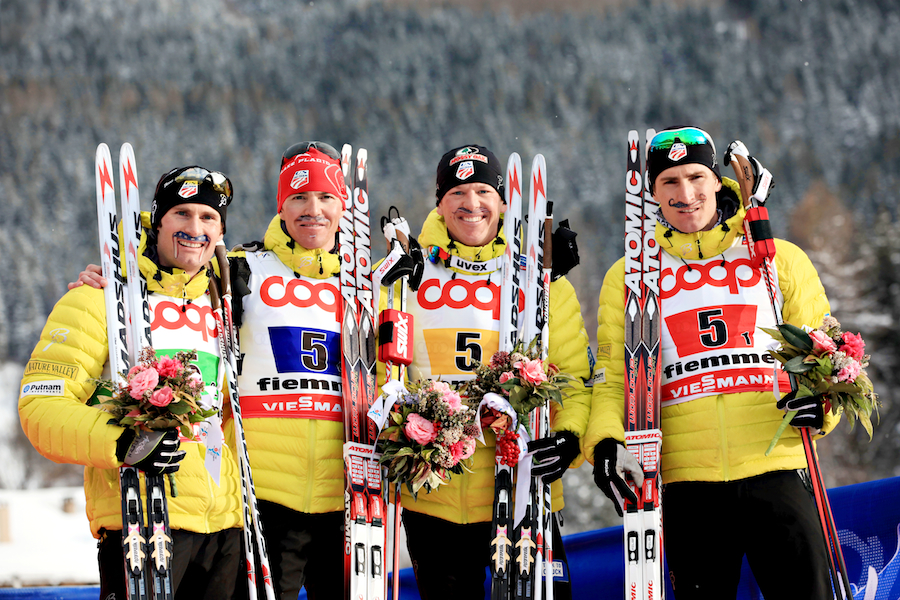
FasterSkier’s coverage of the 2013 FIS Nordic World Ski Championships in Val di Fiemme, Italy, is brought to you by the generous support of Fischer Sports.
VAL DI FIEMME, Italy – Bryan Fletcher had a pretty bold preposition for his U.S. Nordic Combined team the night before the normal hill/4 x 5-kilometer team event at the 2013 Nordic World Ski Championships.
The 26-year-old Steamboat Springs, Colo., native had brought these mustaches, temporary tattoos made by a former schoolmate.
“When I was home I saw one of my classmates from high school started a company called StacheTats, and they had a whole bunch of American flag ones,” Fletcher recalled. “I was like, ‘Those would be awesome to wear to a team event so I brought a whole bunch over.’ ”
While talking tactics among other things at the team meeting, the group decided: they were all going to wear them in competition, and if they won a medal, the coaches would have to shave their eyebrows.
The stakes higher than ever, the Americans headed into Sunday’s team event with added motivation and lots of inquiries from media and spectators. The team’s most seasoned veteran, 36-year-old Todd Lodwick said it was a lot of fun and definitely enhanced his ninth World Championships.
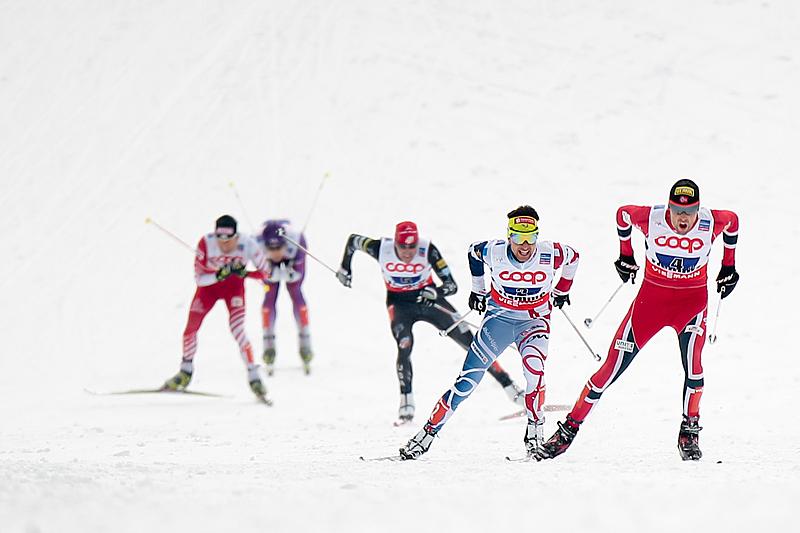
“It just brings team comradery and some laughs and we got some funny looks,” Lodwick said. “The crowd liked it and the TV ate it up.”
Enjoying every moment, even the unforgiving 2.5-kilometer cross-country course at Lago di Tesero, the U.S. men reached the epitome of their day when anchor Billy Demong finished third, 4.2 seconds behind French winner Jason Lamy Chappuis and Norway’s Magnus Moan in second.
Rising from fifth and more than a minute back in the Gundersen start, the Americans – with Taylor Fletcher, his older brother Bryan, Lodwick and Demong – had done it. For the first time at a World Championships, the U.S. medaled in a four-man team event, three years after winning silver in the relay at the Olympics.
At the awards ceremony Sunday night in the center of Cavalese, U.S. head coach Dave Jarrett lifted his ballcap to reveal American-flag temporary tattoos in place of his eyebrows.
“For sure, that was our goal,” Jarrett said before snapping photos of his four guys, with two veterans in Lodwick and Demong and two relative newcomers in the Fletchers, on the brightly lit outdoor stage.
“We could’ve won as easily as gotten fifth, so to split the difference and get a medal is awesome,” he added.
Fifth in the jumping portion, which was complicated by variable wind conditions, the Americans put themselves in fighting position for the relay. Jarrett said Taylor’s effort on the 106-meter hill specifically carried the team after he overcame adversity in the competition round.
Because of the wind, officials moved the bar down about six gates for his jump.
“He didn’t have that bad of a jump, but they just went short,” Jarrett explained. “They canceled that round and then he had to go back up and jump again and he did a great job and took every opportunity to get a do-over.”
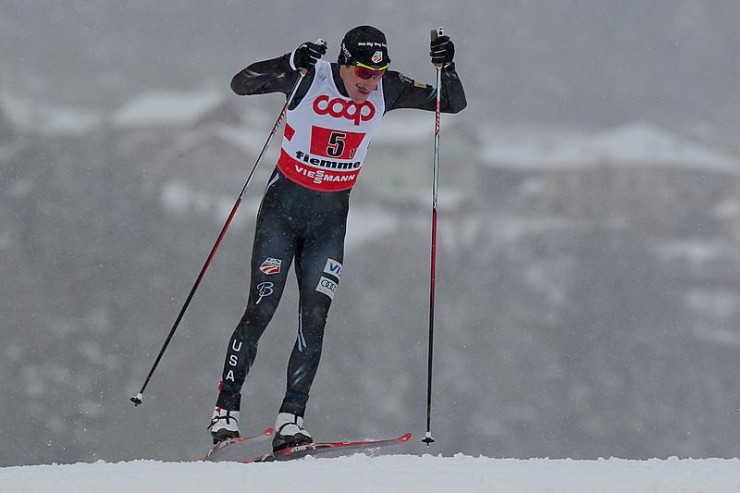
Taylor, 22, ended up posting the team’s second-longest jump of the day (93 meters) after his brother’s mark of 95.5 meters. Two days earlier, Taylor went 85.5 meters on the same hill in the individual competition and Bryan led the team with an individual jump of 92.5 meters.
Jarrett said entire team stepped up their game on Sunday, which made the difference. Starting 1:02 minutes behind Japan in first, the Americans strategized to close the gap as soon as possible. Taylor took that to heart, coming within nearly 30 seconds of the lead by the first kilometer.
About halfway through the scramble leg, Austria’s Wilhelm Denifl started to break away. Taylor said he and Norwegian Jørgen Graabak tried to work together in fourth and fifth to catch Austria, France and Japan head of them.
“You want to work when it’s like that so you can get up to the podium, but also you know that you have to get away from that other person and try to give yourself a better advantage,” Taylor explained. “There’s some small talk going on in the group, but it’s mostly just, ‘Hey, come on, get up to the front, help me out.’ ”
Taylor tagged off to Bryan in fifth, 10.5 seconds behind the leader, but Austria’s Bernhard Gruber continued to pull away and gapped the field by more than 20 seconds on the second leg. Bryan fed off his brother’s performance and brought the U.S. to second just over a kilometer in.
He held the position until shortly before the exchange, where Norway’s Haavard Klemetsen came through less than a second ahead of him, and Japan and France skied close behind in fourth and fifth.
From there, Lodwick had what Jarrett called his best race of the year. He kept the team in contention with France, Norway and Japan, and worked with them to catch Austria’s Lukas Klapfer. Austria slipped to the back of the pack, and Lodwick tagged to Demong in fourth.
Demong didn’t waste any time in taking the lead, pushing the pace to hold off Germany’s Fabian Riessele, who was trying to close a 40-second deficit on the group.
Even with a headwind throughout much of his two-lap leg, Demong stayed in front, trying to get others to help carry the load. Without any takers, the 32-year-old pushed on.
Meanwhile, the rest of the Americans watched anxiously from the stadium. On the final climb, France’s Lamy Chappuis and Moan attacked, but Demong didn’t quite have quite enough left to go with them. As they fought for gold, Demong crested the hill with a small gap to Japan’s Yusuka Minato and Mario Stecher of Austria, and accelerated down into the stadium to hang onto third.
“Even sprinting into the finish, it was anyone’s game,” Bryan said. “It was a nail-biter right to the end.”
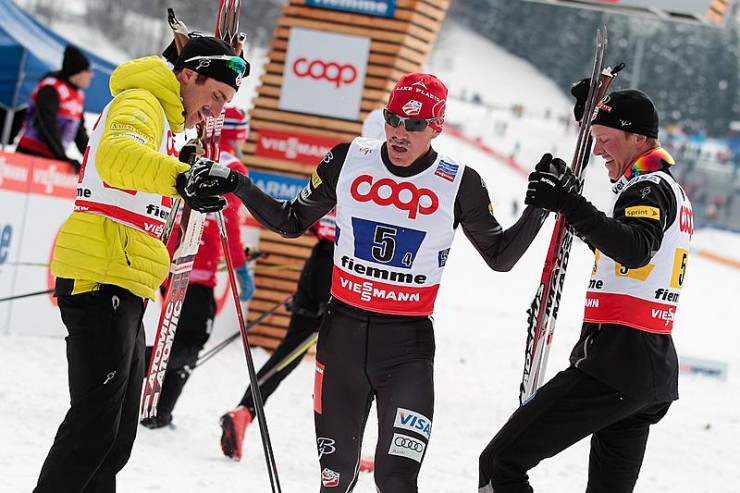
When Demong crossed the line in third, 1.5 seconds ahead of Minato and 3.4 ahead of Austria, his teammates and staff rushed to his side. It was a long time coming – with two fourth-place team finishes in the last two World Championships – but the Americans had finally succeeded.
“For us, this is a dream come true,” Bryan said of his and Taylor’s first World Championships medal. “I literally came into this World Championships being like, ‘If I could just do this once, it would be amazing.’ I’m ecstatic, I think Taylor’s ecstatic and everybody else is ecstatic to come away from this with a medal, especially when our team this season has been a little bit shaky, really up and down, and I think we’re starting to come into our own.”
For Demong, it was his fourth World Championships medal since winning gold and bronze in 2009 in Liberec, Czech Republic, and a silver in 2007 in Sapporo, Japan. The team medal was a first for Lodwick, a two-time individual world champion in 2009, after having helped the team win silver in 2010. And it was an excellent finish for the U.S. exactly 10 years after one of its members, Johnny Spillane, won a World Championship gold at the same venue in Val di Fiemme.
“We’ve had a pretty good season, especially with the Fletcher brothers,” Demong said of their recent breakout results. In January, the team notched its first podium in a World Cup relay, placing third in Schonach, Germany.
“We knew we had to be having a really good day to fight for the medal,” Demong explained. “It would’ve been nice to win, but I think at this point, a bronze can feel like a gold a little bit.
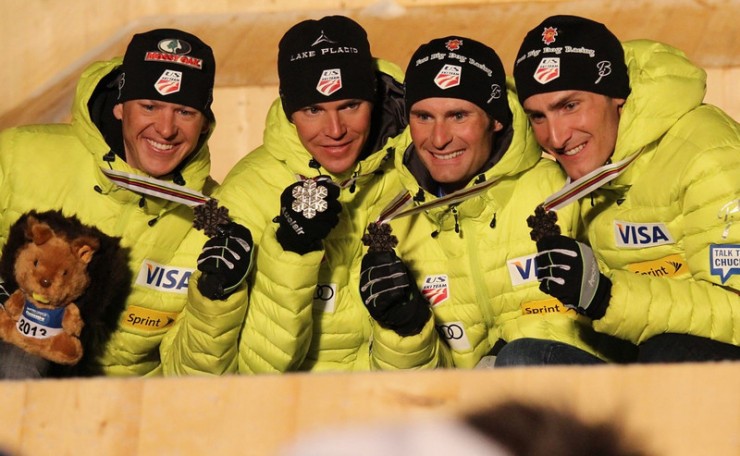
“It was really, really amazing to watch these guys ski up so much time and catch the lead and then be in the hunt,” he added. “I think coming into the [stadium] the way that skis and to be able to pull off a medal felt like a big success.”
Lodwick said he couldn’t be happier.
“Bill and I have been here, but it’s nice to have the next generation of skiers come up and step into places that need to be filled,” he said. “For me personally, this is a bit of a monkey off the back in regards to being fourth at World Championships so many times in the team event and losing a bib and doing all these other things that have hindered us.
“Today we came together,” Lodwick added. “I cant tell you how awesome it was to live in the moment and take it for what it was worth and not get too far ahead of ourselves and smile as much as I could today.”
Especially pleased to see his jumping improve, Lodwick said it hasn’t been easy adjusting to new rules and equipment regulations.
“My jumping throughout the season has been pretty horrible to say the least; I did not start off very well at the beginning of the season,” he said. “The feeling of ski jumping that I used to know is no longer and it’s a new sport. I’ve struggled with it quite a bit, but this is World Championships. You’ve got to bring your A-game and rely on past experiences.
“Hopefully you have teammates that understand that and coaching staff,” he added. “I can’t be more happy than to have the teammates stand up there on the podium … and for it to all come together today, in a place where Johnny won his first medal, that’s pretty f*ing awesome.”
— Audrey Mangan contributed reporting
Alex Kochon
Alex Kochon (alexkochon@gmail.com) is a former FasterSkier editor and roving reporter who never really lost touch with the nordic scene. A freelance writer, editor, and outdoor-loving mom of two, she lives in northeastern New York and enjoys adventuring in the Adirondacks. She shares her passion for sports and recreation as the co-founder of "Ride On! Mountain Bike Trail Guide" and a sales and content contributor at Curated.com. When she's not skiing or chasing her kids around, Alex assists authors as a production and marketing coordinator for iPub Global Connection.



